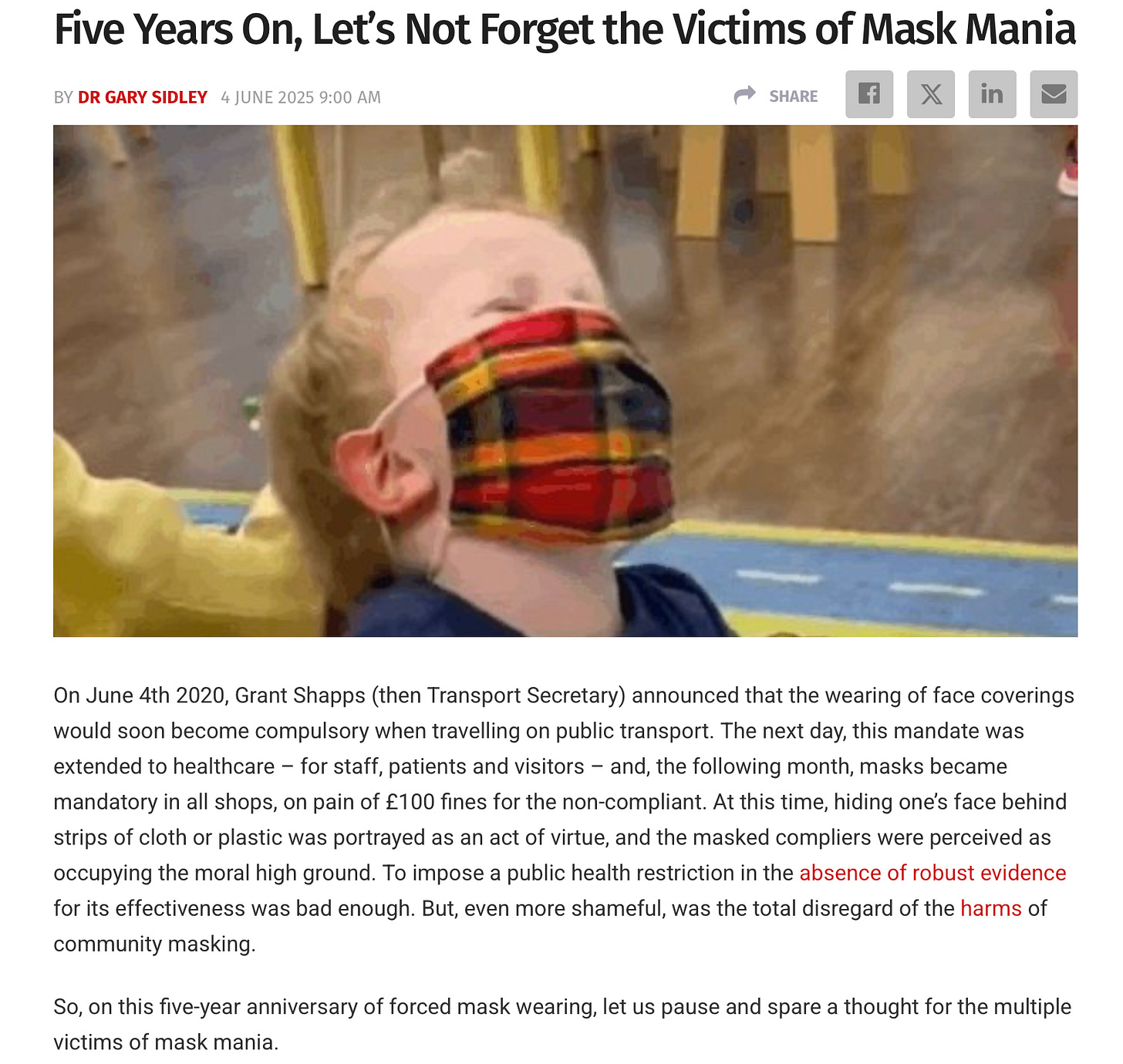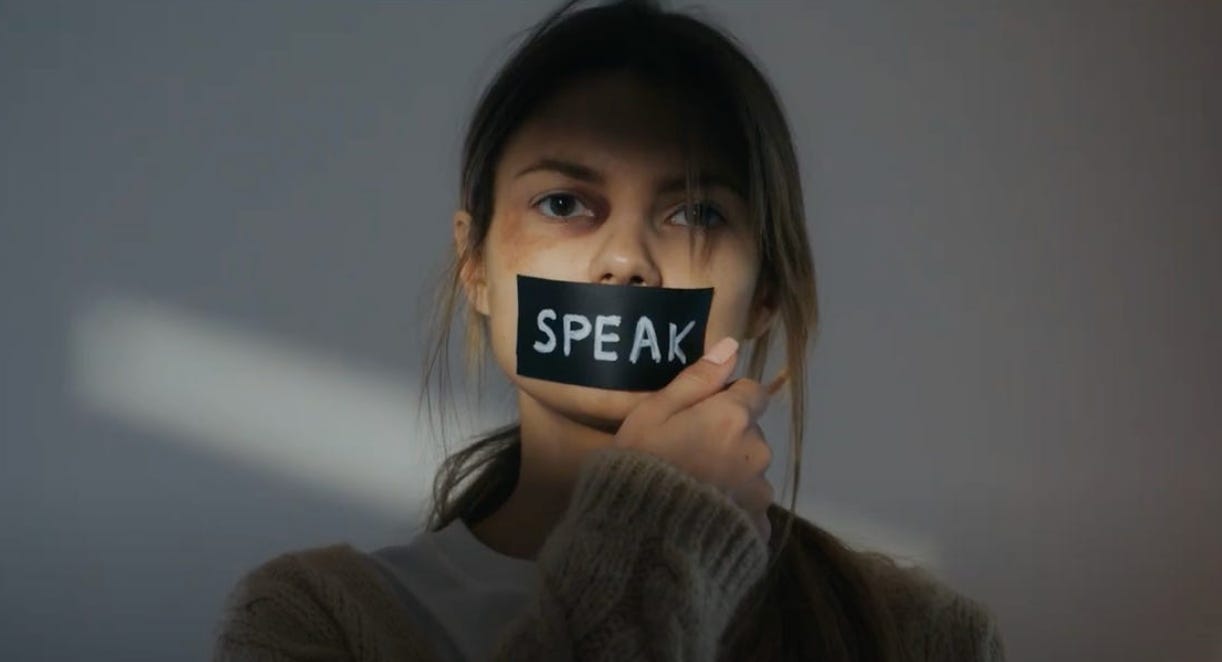Masking Humanity
"Five years on, let's not forget the victims of mask mania... and let's keep blanket masking out of health and social care"
It is five years since the mandatory wearing of face coverings was introduced in the UK. Not during respiratory virus season, i.e. November to April. But in June.
The fact that there was never any robust scientific evidence in favour of wearing masks was reflected in what the public health officials and government ministers were telling us during Spring 2020, towards the end of the annual respiratory virus season:
Looking back, it seems more obvious than ever to me that the main purpose of introducing masks — at the height of summer — was to perpetuate fear.
Some would call it weaponised behavioural psychology.
In case it’s helpful to anyone, consider what Jay Bhattacharya — Professor Emeritus of Health Policy at Stanford University, and the new Director of the US National Institutes of Health (NIH) — had to say here about masks in this recent long interview with US neuroscientist and podcaster Andrew Huberman (emphasis added):1
[Bhattacharya] …the idea that closing schools is good for you… the idea that you wearing a cloth mask prevents you from getting covid… the idea that immunity after covid recovery doesn’t exist… the idea that the vaccine will protect you from getting and spreading covid forever... None of that was rooted in science. And yet the public health authorities of this country decided that they were going to enforce the same kind of… ethical constrictions on those topics as they do [with] smoking.
[Huberman] When you say none of it was rooted in science, are you saying the science was mixed, or there was literally no evidence?
[Bhattacharya] There was really no science. So, for instance, the idea that cloth masks prevent you from getting and spreading respiratory diseases… There were a dozen randomized trials on flu before the pandemic, and… there was a Cochrane report looking at the literature on masking and influenza. And they concluded that the evidence was weak at best that these kinds of cloth masking in population settings actually prevent… the spread of influenza.
[Huberman] I heard a number of people say, “What’s the big deal about wearing a mask…? It’s not the same thing as a vaccine. It’s… a mask”… I’m just opening this up for sake of of consideration… Why did the masks become such an issue? Was it because it was a mandate? Is that what it’s really about?
[Bhattacharya] The mandate mattered, but… there were harms, some of which were recognized, some of which were not. For instance, I heard from parents of… hearing-impaired kids that the mask-wearing impaired the ability of the kids to learn to lip read… it’s also true that if you adopt and embrace public health messaging that’s self-evidently not rooted in science, you’re going to undermine the public trust in science and in public health.
[Huberman] I will say, based on these voices that I hear from a lot, that’s what they're asking for. They’re asking for the exact message that you’re delivering now, which is… I’ll say it differently… They want to hear the scientific community say, “We messed up.”
[Bhattacharya] And we should. We should absolutely say that… For instance, you wear a mask while you walk into the restaurant… you sit down to eat, and you take your mask off, and that protects you protects people from getting and spreading covid? How? Everyone could see that. You don’t need to be a scientist to see that. That was obviously ridiculous public health messaging…
[Bhattacharya] And let’s just say… you asked… could this public health messaging be dangerous. Well, yes. Imagine someone who’s… 80 years old… They have a lot of chronic conditions. It’s the height of the pandemic…
And they’re told, “If you wear a cloth mask you’re safe.” [Then] they go out in public and take risks that they otherwise would not have taken on the idea that they’re safe wearing a cloth mask and they get covid. The recommendation not rooted in science actually could end up killing people and probably did… so… none of these things are… low cost. It may be low cost to somebody who’s not particularly bothered by mask wearing, but [the policy] and still nevertheless [ends] up causing harm. And I think it… did.
I remember making a similar point about the false sense of security to various people back in 2020, including to the senior staff at the church I attend.
These days I wonder how much truly robust evidence there actually is that viruses spread from one person to another. And to what extent it is merely the case that the susceptible fall ill due to the inescapable presence of an airborne virus whose particles are much smaller than the holes in a cloth mask.
On the subject of harms from masking, I recommend this article from retired NHS Consultant Clinical Psychologist Dr Gary Sidley:
As he puts it, let’s not forget:
the swathes of babies and toddlers who failed to bond with their faceless care givers, thereby stunting their longer term cognitive and emotional development…
the many victims of historical physical and sexual abuse who were further traumatised by the mask requirements…
the 18 million UK adults with hearing difficulties who — because masks muffled voices and made it impossible to lipread — were plunged into a communication vacuum…
the patients with existing respiratory problems whose breathing difficulties were exacerbated, those who were put at greater risk of contracting pneumonia and other bacterial infections, and those who were exposed to the inhalation of micro-plastics…
the millions of distressed and frightened NHS service users and care home residents who, as a consequence of the often stymied relationships resulting from masked protagonists, experienced sub-optimal care…
the rational minority who, because they opted not to wear a mask, were harassed and abused by others. On one occasion such an assault led to the death of a young woman…
Sidley is also co-founder of the Smile Free campaign, which I was grateful to see (and join) several years ago:
But masks have not entirely gone away, and Smile Free is still active, not least with the release of the film Masking Humanity marking five years since the introduction of face coverings during the covid era.
Here is the two-minute trailer…2
Plus a transcript for those who prefer a written version:
During the covid era, one idea was presented to the public as a moral duty. Politicians and health officials imposed it on the population not because the evidence demanded it, but for political motives.
Masking.
[Clip of BBC Health Correspondent Deborah Cohen] Newsnight understands that the World Health Organization committee that reviewed the evidence for the use of face coverings in public didn’t back them. But after political lobbying the WHO now recommends them.
In doing so [the WHO] condemned the most vulnerable among us, in care homes and health settings, to a round-the-clock nightmare of faceless isolation many would never live to see the end of.
In this film you’ll discover who was responsible. It will also reveal how this tragedy could have been avoided, had courage prevailed over cowardice and conformity at the right time.
[Clip] You’ve completely changed the world and installed a dystopia on them that they can’t get out of.
[Clip] Removing facial expression for somebody with dementia who’s relying almost totally in facial expression not just for communication but for comfort, for easing stress and distress, for easing loneliness, to remove that I think is just the epitome of cruelty.
[Clip of Grant Shapps] As of Monday the 15th of June, face coverings will become mandatory…
Masking, as we will show, became a cruel injustice inflicted on those least able to defend themselves. And, disturbingly, it’s a chapter of history that hasn’t truly ended. Without recognition of the damage done we stand on the precipice of repeating the very same mistakes.
And here is the full documentary:
What happens when public health forgets human connection? Masking Humanity is a powerful documentary uncovering how mandatory mask policies in care homes and hospitals during Covid caused deep, lasting harm — especially for people with dementia, the elderly, and patients at end of life. Through interviews with families, frontline workers, and experts, the film exposes:
The political lobbying that drove global mask guidance
The isolation and distress caused by faceless care
The failure to protect basic human dignity
Why this mistake could be repeated unless we face the truth
I found the film to be well worth watching. It is vitally important that we do not forget what has happened, not least with a view to ensuring that masks are never again mandated in care home and hospital settings.
There is a very modern assumption that to live is just the same thing as to be alive. But the face is a primary engine of social interaction. And to compel us to cover it up is an act of spiritual vandalism. Our smiles, frowns and other expressions remind us that we are not just bodies, but also persons; not just objects in the world, but also perspectives on the world. The reason why wearing a face mask seems strange has nothing to do with it being a novelty. It is because it is unnatural in the sense that it goes against our nature as persons.
It is unthinkable that this could ever be repeated. Yet, without bravery and leadership from health and social care sectors, we are at huge risk of reliving this nightmare.
Related:
Unexpected Turns homepage
The most-read articles can be found here
That interview is the subject of a separate post planned for sometime next month
If the link fails to open the first time, try refreshing the browser window














![[SPCI-4]: "Even the organisations... that were meant to look after the interests of the elderly and the frail, they were useless… No-one spoke up for those without a voice, except their families"](https://substackcdn.com/image/fetch/$s_!fWnK!,w_140,h_140,c_fill,f_auto,q_auto:good,fl_progressive:steep,g_auto/https%3A%2F%2Fsubstack-post-media.s3.amazonaws.com%2Fpublic%2Fimages%2Fdb3635cc-e1be-4fac-9cf5-6b71be58d94f_1154x1012.png)
![[SPCI-3] "Just from simple first principles, we can understand that these are really harmful measures that were implemented"](https://substackcdn.com/image/fetch/$s_!pdgM!,w_140,h_140,c_fill,f_auto,q_auto:good,fl_progressive:steep,g_auto/https%3A%2F%2Fsubstack-post-media.s3.amazonaws.com%2Fpublic%2Fimages%2F920b06c3-5175-4cec-b257-0ab56fb03de9_856x742.png)


